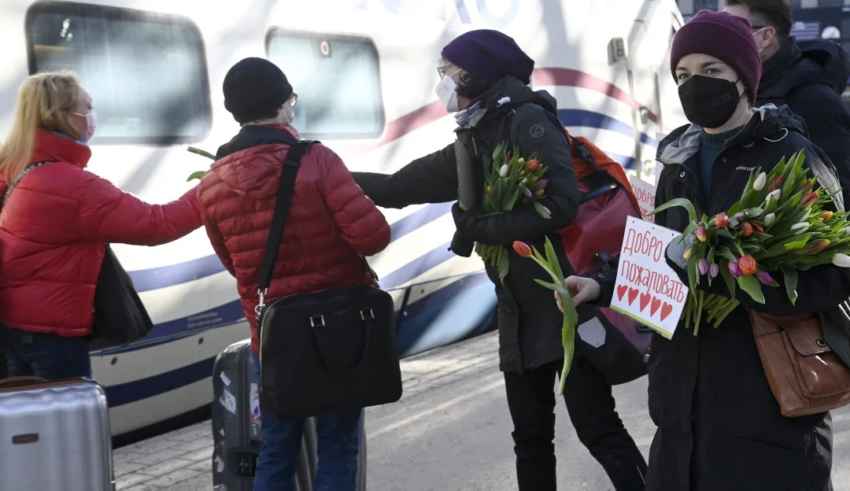
Since the war outbreak, millions of Ukrainians have left their country. Many have lost their homes, family members and friends and now live in Poland, Romania or Germany. No one is imposing time limits on them, understandably.
Simultaneously many Russians also left their country. They are people who left after the war began, out of horror at the government, fear of reprisals or forced recruitment for the war. Among them many journalists, IT specialists and artists. Many host countries let them in, but that period ends soon. In most countries, the right of residence for temporarily tolerated persons expires after 90 days. This applies to Germany as well as to Turkey.
First, Finland, a necessary passage
Finland appears to be the ideal destination for Russians who want to flee their homeland and get into the EU. It must be said that since the airspace to the European Union and North America is now closed and the Western borders are closed by the war or the unsympathetic shadow of Belarusian Alexander Lukanchenko, an ally of Vladimir Putin, Russia offers few ways out for those who wish to leave.
Those who want to leave have no choice but to take the road or the railroad across the 1,340 kilometres of common border between Russia and Finland. However, the first difficulty is that Finland is part of the Schengen area, so a valid vaccination pass and a visa are required to enter the country, which limits the number of people eligible. Even more so when you leave a country as poorly vaccinated as Russia and which has massively used Sputnik-V, a product not recognised in Europe.
In Germany, the absurd situation is currently occurring where politicians want to offer permanent refuge places for fleeing Russians, but German bureaucracy is far from ready in some states, including Berlin. The law says ninety days is ninety days. But neither can nor will they deport the well-qualified journalists and artists. It would be the next big loss of face for Germany, after many allies criticize the country for the German government’s hesitations on arms deliveries and pipeline shutdowns. So currently the Foreign Office, Interior Ministry and embassies are shuffling the issue back and forth. No solution to be found yet and hundreds of Russians that are already stigmatised as traitors by Putin, are risking deportation.
There would be two options. One would be to keep the Russians in the country as “foreign specialists” under Section 18 of the German Residence Act. Or they would benefit from the exemption under Section 22 of that same Act and stay. The journalists concerned don’t think it matters which solution is found in the end. The main thing is to do it quickly, because for many the 90 days expire at the beginning of next month.
The situation is even more precarious in Turkey, considering the country’s relationship to Russia. Flying to Turkey still being possible, many journalists and artists fled to Turkey, and especially to Istanbul, in the first weeks after the start of the war. They too can stay there for 90 days, but not a day longer. In Istanbul a lot of journalists take a stand and protest regularly in front of the Russian General Consulate. What mostly comes out of talking to them is that they don’t want to go back to Russia, at least until Putin’s gone, and that the part of Russians not seeing, or not wanting to see, Putins game are accomplices to his atrocities.
EU can not leave Russian regime critics alone in this situation
But now Russians in Turkey face exactly that: forced return. After 90 days, they must leave. They have approached the authorities, have written to MPs, but so far there has been no effort to find an exemption in Turkey’s visa law. Some reports say, Russians also contacted European consulates in Istanbul. But everywhere comes the same stalling reply that there is no sufficient justification for issuing a visa because these Russians don’t face actual life threatening situations in Russia. So they don’t really want these well-educated Russians to leave but can’t pull out a solution.
The acceptance of Russian political refugees in Istanbul is apparently so new for the European consular bureaucracy that it cannot react to it adequately. Even in the Baltic states, a Russian journalist from Riga is also saying there are problems with the 90-day rule.
It is bitterly necessary to solve this problem. The EU cannot impose sanctions against Russia, paralyse air traffic out of the country, and vent about the inhumane policies of the Russian government, while at the same time slamming the door in the faces of Russian regime critics. Not only Russians who have fled to the EU must be allowed to stay. Those stuck in Turkey and other countries should also be allowed into the EU. Europe is the natural refuge for the conscience and free spirit of exiled Russians until Putin’s regime is eventually no more. But that may take more time, certainly more than 90 days.
Countries in Europe and other parts of the world should make the immigration of these people easier. They bring with them a lot of expertise for which there is a great demand on the labor market. In the short and medium term, this would lead to a further weakening of Putin’s Russia and make the rhetoric of the evil West in Russia less credible. A liberal visa policy would complement existing sanctions well.
Unlike economic sanctions, which create disadvantages for all Russians, visas would weaken the regime but extend a hand to the “Putin-skeptic” Russian population and offer them a perspective.
https://www.bbc.com/news/world-60624500
https://www.bbc.com/news/world-europe-60697763
https://www.theguardian.com/world/2022/mar/24/russians-fleeing-war-seek-solace-in-istanbul
https://www.washingtonpost.com/world/2022/05/01/russia-tech-exodus-ukraine-war/
https://www.politico.eu/article/russians-fleeing-putin-need-our-help/
By The European Institute for International Law and International Relations.















